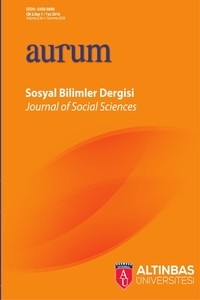MAHREMIYETIN KONTROLÜ: GENÇ YETIŞKIN LATINO GÖÇMENLERIN HAYATLARINDA KATOLIK KILISESININ YERI VE ETKISI
ÖzetEvlilik hazırlığındaki Latino göçmenlerin hayatlarında Katolik Kilisesinin yerini inceleyen bu çalışma dinin,özellikle de mahremiyet söz konusu olduğunda, değişen etkisine odaklanmaktadır. Kilisenin zorunlututtuğu evliliğe hazırlık kursları bu dini kurumun disipline edici etkisini ve inananların buna verdikleri tepkiyianlamak için önemli bir alan açmaktadır. Bireylerin bu kursları değerlendirme şekli kilisenin hayatlarındakikurumsal kontrol girişimlerini nasıl değerlendirdiklerinin de göstergesidir. Bu çalışma ortaya koymaktadır ki,özellikle cinsellik ve özel hayat alanlarında Katolik kilisesinin kontrol ve dikte edici gücü azalmaktadır. Çeşitlidini öğretilerin bireylerin tercihlerine göre kabul ya da reddi yoluyla gerçekleşen dağınık bir mikro-direnişhali gözlemlenmektedir. İnananlar kendi şahsi deneyimleri ve dini inançları üzerinden Kilisenin öğretileriniyorumlamakta ve ‘dindarlığı’ şahsi ve çoğu zaman özgün şekillerde tanımlayarak bir dini kimlik oluşturmaktadırlar.Dini kimliğin bu yeniden kurgulanışı özellikle cinsellikle ilgili konularda öne çıkmaktadır.
Anahtar Kelimeler:
Din, Evlilik, Cinsellik, Güç ve direniş, Kurumsal kontrol
DISCIPLINING INTIMACY: THE ROLE OF THE CATHOLIC CHURCH IN EVERYDAY AND INTIMATE LIVES OF YOUNG ADULT LATINOS
AbstractInvestigating the impact of Catholicism on intimate relationships among young adult Latinos, this workexamines whether the role of religion has changed for this particular group. Marriage preparation classesprovide a window for understanding the disciplinary power of the Church and how individuals respondto this power. Individuals’ response to these programs is an indicator of their perception of the legitimacyof the Church in dictating ways of life. This research shows that the authority of the Catholic Church is indecline, particularly when disciplining of intimate lives is concerned. Selective rejection of certain teachingsof Catholicism is a diffused act of micro-level resistance to the established order. Believers use their own livedexperiences and practical knowledge of Catholicism to interpret the teachings of the Church. They constructa religious identity influenced by individualism, where ‘being a good Catholic” is determined according toown and –sometimes unique- terms of each individual. This re/de-construction of religious identity is mostsignificant in matters of sexuality.
Keywords:
Religion, Marriage, Sexuality, Power and resistance, Institutional control.,
___
- Archdiocese of Los Angeles. (2005). Engaged Encounter. Retrieved March 13, 2005 (http://familylife.la-archdiocese.org/familylife/MarriagePrep/EngagedEncounterE.htm).
- Archdiocese of Los Angeles. (2005). Marital Preparation. Retrieved March 8, 2005 (http://familylife.la-archdiocese.org/familylife/MarriagePrep/marriagepreparation.htm).
- Berger, P. (1969). The Sacred Canopy. New York: Doubleday.
- Carrette, J. (1999). “Prologue to a Confession of the Flesh.” Pp. 1- 45 in Religion and Culture Michel Foucault, edited by Jeremy Carrette. New York: Routledge.
- Christiano, K. (1991). “The Church and the New Immigrants.” In Religion and the Social Order, Volume 2 Vatican II and U.S. Catholicism, edited by Helen R. Ebaugh. Greenwich and London: JAI Press.
- D’Antonio, W. V. (1985). “The American Catholic Family: Signs of Cohesion and Polarization.” Journal of Marriage and the Family, 47:2, 395-405.
- D’Antonio, W. V., Davidson J. D., Hoge D. R. and Meyer K. (2001). American Catholics Gender, Generation and Commitment. New York, Oxford: Altamira Press.
- Dillon, M. (1998). “Rome and American Catholics.” The Annals of the American Academy of Political and Social Science, 558, 122-134.
- Elizondo, V. (1999). “The Sacred in the Latino Experience.” Pp. 20-23 in Americanos: Latino Life in the United States, edited by E.J. Olmos, L. Ybarra and M. Monterrey. Boston and New York: Little, Brown and Company.
- Foucault, M. (1999). “Sexuality and Power.” Pp. 115-130 in Religion and Culture Michel Foucault, edited by Jeremy Carrette. New York: Routledge.
- Foucault, M. (1999). “On the Government of the Living”. 154-157 in Religion and Culture Michel Foucault, edited by Jeremy Carette. New York: Routledge.
- Foucault, M. (1995). Discipline and Punish. Alan Sheridan (Trans.), 2nd edition. New York: Vintage Books.
- Galston, W. (2000). “The Law of Marriage and Divorce: Options for Reform.” Pp. 179-188in Marriage in America, edited by Martin K. Whyte. New York: Rowman and Littlefield Publishers.
- Göle, N. (2000). “Snapshots of Islamic Modernities.” Daedalus, 129: 1, 91-117.
- Gorski, P. S. (2003). “Historicizing the Secularization Debate,” in Handbook of the Sociology of Religion, edited by Michele Dillon. New York: Cambridge University Press.
- Hervieu-Leger, D. (2000). Religion as a Chain of Memory. Simon Lee (Trans.). New Brunswick, New Jersey: Rutgers University Press.
- Hirsch, J. S. (2003). A Courtship after Marriage. Berkeley, Los Angeles, and London: University of California Press.
- Hoge, D. R., Dinges W. D., Johnson M., S.N.D. de N. and Gonzales J. L. (2001). Young Adult Catholics Religion in the Culture of Choice. Notre Dame: University of Notre Dame Press.
- Hurtado, A. (1995). “Variations, Combinations and Evolutions: Latino Families in the United States.” Pp. 40-61 in Understanding Latino Families, edited by Ruth Zambrana. Thousand Oaks and London: Sage Publications.
- Illouz, E. (1997). Consuming the Romantic Utopia. Berkeley, Los Angeles and London: University of California Press.
- Jamieson, L. (1998). Intimacy, Personal Relationships in Modern Societies. Malden, MA: Polity Press.
- Kohmescher, M. F. (1999). Catholicism Today, A Survey of Catholic Belief and Practice. New York: Paulist Press.
- McBrien, R. P. (1992). Report on the Church: Catholicism after Vatican II. San Francisco: Harper San Francisco.
- McLachlan, P. (1997). “Sacrament of Holy Matrimony.” Retrieved February 17, 2005 (http://www.catholicpages. com/marriage/sacrament.asp).
- Schwartz, P. (2000). “Peer Marriage.” Pp. 53-63 in Marriage in America. Edited by Martin K. Whyte. New York: Rowman and Littlefield Publishers.
- Shumway, D. R. (1993). Michel Foucault. Charlottesville and London: The University Press of Virginia.
- Skolnick, A. (1991). Embattled Paradise. New York: Basic Books.
- Touraine, A. (1995). Critique of Modernity. David Macey (Trans). Oxford and Cambridge: Blackwell.
- Van Beeck, F. J. (1985). Catholic Identity after Vatican II. Chicago: Loyola University Press.
- Wilkes, P. (1996). The Good Enough Catholic. New York: Ballantine Books.
- Williams, L. and Jurich J. (1995). “Predicting Marital Success after Five Years: Assessing the Predictive Validity of FOCCUS.” Journal of Marital and Family Therapy, 21:2, 141.
- Wolfe, A. (2003). The Transformation of American Religion. New York and London: Free Press.
- ISSN: 2458-9896
- Yayın Aralığı: Yılda 2 Sayı
- Başlangıç: 2016
- Yayıncı: Altınbaş Üniversitesi
